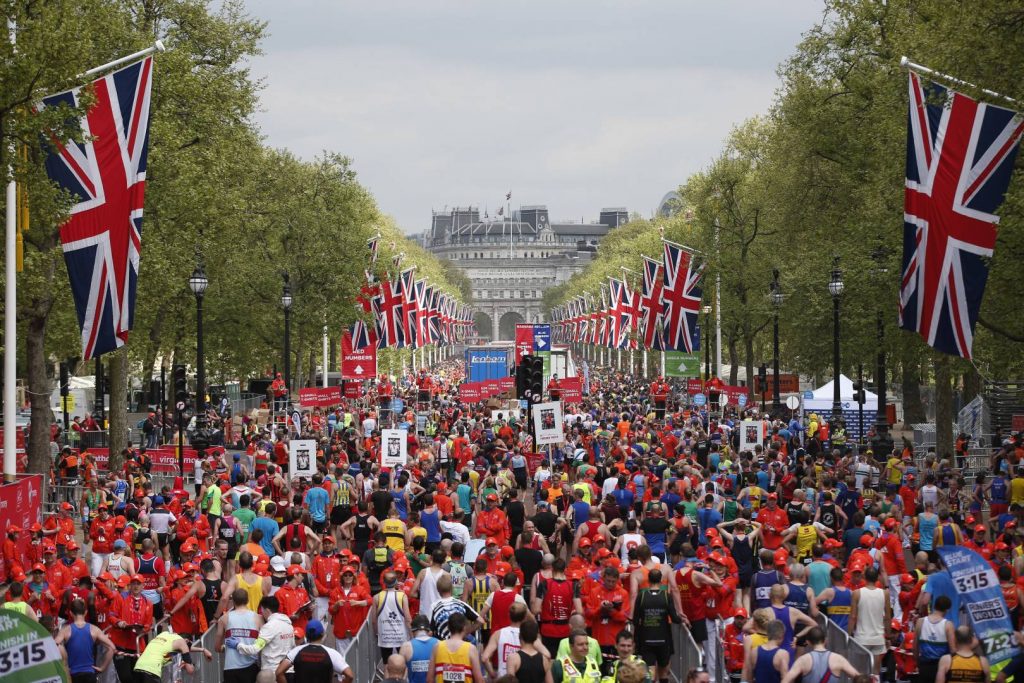Where Does The Future Of Mass Participation Events Lie?
October 12, 2020
Just last week the London Marathon took place for the 40th time, however the circumstances of the 2020 race, and how it was run, have led Ben Page to wonder where the future of mass participation events may lie in the post-Covid world…
On Sunday the 4th of October 45,000 people from 81 countries took part in the 2020 London Marathon across the globe, as the event was forced to take itself online for the first time ever thanks to the coronavirus pandemic.
Meanwhile, at the same time as those runners were heading off for their 26.2 miles on the day itself, a handful of elite athletes raced through the streets of London along the real course, after staying within a bio-secure environment to be able to compete.
A key question stands out from this, how long will these mass participation events be suffering the effects of Covid-19?
As simply the latest event to fall foul of Covid-19, the London Marathon must be applauded for making the best of a bad situation by allowing its runners to still complete the race virtually, as well as letting thousands of others across the world to join them who may otherwise never have been able to participate.
Every runner and charity was offered the opportunity to defer their place in the physical event until either 2021, 2022 or 2023 as well as taking part in the virtual race, following postponement from the originally scheduled date of April 26th.

But a key question stands out from this, how long will these mass participation events be suffering the effects of Covid-19, and will they return to full strength?
Last month Virgin sold their mass participation event business ‘Virgin Sport’ to LimeLight Sports, indicating that they may have decided that now is the time to move on from the business as it is set to continue, like many areas of sport at this time, its difficult period as the coronavirus pandemic persists.
While fans are still forbidden from attending sporting fixtures even with social distancing, it seems extremely difficult to picture hundreds or thousands of people lining the streets in close vicinity of one another in the near future.
Yet in the announcement of the deal, Limelight Sports Group CEO Craig Dews was bullish on the prospect of mass participation events returning stronger than ever, stating: “With the cancellation of most participation events in 2020, this has been a hugely challenging time for everyone. However, we know that it has resulted in an even greater demand for our events and we are extremely optimistic about the future.”
Many local and national events across the globe are now likely to be restricted into early 2021, with the great unknown as to the possibility of getting thousands of people together once again still remaining – next year’s London Marathon is already rescheduled for a similar time slot in October 2021 as for this month’s event.
While fans are still forbidden from attending sporting fixtures even with social distancing, it seems extremely difficult to picture hundreds or thousands of people lining the streets in close vicinity of one another in the near future, so new ways of creating the race atmosphere are having to be found.
Instead, just a fortnight ago Sir Mo Farah, arguably Britain’s greatest ever athlete, took the opportunity to join ISORUNCLUB’s latest virtual 10-mile race, allowing himself to compete against other runners simply by leaving his house and simply turning on a run-tracking app such as Strava.
With the ability to engage with fellow competitors all around the world now easier than ever and providing access to take on one another in a safe environment, could online events such as this and the virtual London Marathon be the future?
In cycling, innovations such as Peloton and Zwift had been steadily on the rise but have now leapt incredible levels during 2020 after providing a tremendous boost to the cycling community by giving riders the ability to race from the comfort of their own homes during the pandemic.
In a world where people are now busier than ever, it is becoming more and more difficult for people to take the time to travel potentially hours to and from an event, not even including the race itself.
Do these new, innovative races which simplify the process and allow participants to take part simply by having a smartphone or fitness watch, provide the perfect opportunity for a new style of races?
The buzz of a true race day is certainly great and the human connection something that is necessary and very much missed in today’s Covid-19 restricted environment, and these races will certainly continue to have their place.
With Virgin Sport opting to let go of their events business, they may be looking at this as an opportune time to cut themselves free of this sector, with the potential difficulties it may continue to face.
The buzz of a true race day is certainly great and the human connection something that is necessary and very much missed in today’s Covid-19 restricted environment, and these races will certainly continue to have their place.
But are athletes as inspired to run from home without people lining the streets cheering them on and seeing their fellow competitors alongside them, or is the achievement, the health benefits and ability to get the competitive juices flowing enough?
It remains to be seen…



